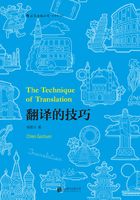
(2)用疑问句来翻译
疑问句(Interrogative Sentence)是发出疑问的文句,正好像肯定形(Affirmative Form)的句子大都可以变成否定形(Negative Form)的句子一样,一般的叙述句也是大都可以变成疑问句的。例如“他礼拜天上教堂。”译成:
He goes to church on Sunday. 是肯定平叙句,而
He does not go to church on Sunday. 是否定平叙句。
Does he go to church on Sunday?才是疑问句。
感叹句有时也勉强可改成否定,不过只能改为相反的意思,例如“这朵花多么美呀!” How beautiful this flower is!改为否定时便成为“这朵花多么丑呀!” How ugly this flower is!改为疑问句则成为Is this flower beautiful?意为“这朵花美吗?”和感叹句的含义(对此花之美大为惊叹)大不相同了。
英文的疑问句,从用字的排列上看,有三种基本的构成形式。
1. 最普通的字序(word-order)为:
Predicate-Verb + Subject
(a)在下列动词的场合,不用Do-Form:Be(was;were),have(Past Tense时偶然也可用Do-Form),shall(should),will(would),can(could),may(might),must,ought to,need(v. aux.),dare(v. aux.),used to.
你好吗?
Are you well?
他来了吗?
Has he come?
我们赶得上火车吗?
Shall we be in time for the train?
你明天要来吗?
Will you come tomorrow?
你能读中文吗?
Can you read Chinese?
我可以回家去了吗?
May I go home?
你一定这样快就要走吗?
Must you go so soon?
我应该做这事吗?
Ought I to do this?
他非急不可吗?
Need he hurry?
你敢从那高墙上跳下来吗?
Dare you jump from the top of that high wall?
他曾经住在这里吗?
Used he to live here?
(b)在其他的动词的场合,就要用Do-Form:
你喜欢他吗?
Do you like him?
你昨天看见他吗?
Did you see him yesterday?
2. 主语为疑问词或含有疑问词时的字序为:
Subject + Predicate-Verb
什么风把你吹来的?
What brought you here?
《哈姆雷特》是谁作的?
Who wrote Hamlet?
昨天有谁来了?
Who came yesterday?
什么人(哪一个)这样说的?
What(Which)man said so?
要做什么?
What is to be done?
如果在1.型上再加疑问词时,则仍依照1型的字序,不必改变。
他说什么?
What did he say?(句中what为say的宾语)
你有多少孩子?
How many children have you?
他是哪里来的?
Where has he come from?(句中的where为from的宾语,from where为Predicate-Verb的Modifier.)
你讲的是谁?
Whom are you talking of?
你何时从英国回来的?
When did you return from England?(句中的when为Predicate-Verb的Modifier.)
3. 全照平叙句的字序,只消在句尾加上一个Interrogation Mark(疑问号),以表示疑问的意思就行了。说的时候,句尾稍加扬起。
你还没有去吗?
You are not going yet?
上面这三种疑问句的造型,还可以补充说明一下。属于1型的疑问句,都是可以回答Yes或No的,在说话时,这类问话都要在句尾用升调(Rising Intonation)。至于2型的疑问句,就不能回答Yes或No,因为它所问的不是是非的问题,而是“是什么”,“为什么”,“怎么样”,“哪一个”,“何时”,“何地”,“何人”等的问题。这类问话都是要在句尾用降调(Falling Intonation)的。至于3型已如上述,在说话时句尾要用升调,而文字的排列次序,完全和平叙句一模一样,只在句尾多了一个问号而已。这一类型的疑问句,也可再细分为下列两类:
(a)对于说话的人原是用不着要问的,不过为慎重起见,再来问一下,例如:
我想,你有钱吧?
You have some money,I suppose?(Stevenson)
这个我可以看吧?
I may read this?(Dickens)
情形与此类似,而将疑问句的省略式附于平叙句之后,也是口语中经常见的。英文把它叫做Tag-question,通常那附加的疑问句是不要译出的。
你不喜欢读小说吧?
You don’t like to read novels,do you?
他去了美国吧?
He has gone to America,hasn’t he?
你每个礼拜五都有英文课吧?
You have English lessons every Friday,don’t you?
他们早餐吃茶点的吧?
They have tea for breakfast,don’t they?
天气很好呀。
It’s a fine day,isn’t it?(J. K. Jerome)
(b)凡表惊讶或怪异的时候,也可以用这种形式。
你不想去?
You don’t wish to go?
我的父亲死了?
My father is dead?
上面这种形式的句子,普通常用不定词的造句来表达,例如:
他欺骗我?
He to deceive me?( = To think that he should deceive me!)
一个英国人叛国?
An Englishman betray his country?
路易士跟布兰芝结婚?
Lewis marry Blanche?(Shakespeare)
怎可放弃真理的大义?
How relinquish the cause of truth?(Goldsmith)
这三种疑问句的基本构成形式,Harold E. Palmer把1型叫作General Question(一般疑问),2型叫作Special Question(特殊疑问);而Otto Jespersen又把1型叫作Nexus Question(叙述关系的疑问)。2型叫作X-question(含有未知数的疑问)。至于3型就被Onions及Curme称为Deliberative Question(深思熟虑的疑问)。
除此三种而外,还有一种所谓Rhetorical Question(修辞的疑问),是指那些表面上是疑问句,实则什么都不要问,而只是作为一种反语来表示自己的相反的意见,好使对方接受而已。这种表现法实较平叙句更为有力,更要充满感情,例如:
有什么用?
What is the use?( = It is no use.)
谁不晓得?
Who does not know?( = Everyone knows.)
有人写过这样没有意义的东西吗?
Was ever such nonsense written?( = Never was such nonsense written.)
在这种修辞的疑问中,肯定的疑问句相等于否定的平叙句,例如:
黑人能够改变他的肤色,豹子能够改变它的斑纹吗?
Can the Ethiopian change his skin,or the leopard his spots?如用平叙句说时,当然就变成cannot了。
否定疑问句相当于肯定平叙句,例如:
这不好笑吗?
Isn’t it funny?( = It is very funny.)
有时连句尾的问号都可以省去:
Yet,are we not like spoilt children who have so many new toys to play with that we have ceased to wonder at anything.(可是,我们真好像是不断地给与许多新玩具的惯坏了的孩子似的,对任何东西都不感到新奇了。)
有时加上一个否定字的not,也和没有此字的句子一样,结果变成同样的意思,例如:
他发现这个时极为惊异。
What was hit astonishment on finding it? = How great was his astonishment on finding it!(感叹句)
What was not his astonishment on finding it?(修辞的疑问) = No astonishment could be greater than his was on finding it.
兹就四种疑问句分别举例译出如下:
(一)一般疑问句
今夜月亮圆了没有?
Is the moon full tonight?
公众不是最好的批评家吗?
Is the public not the best judge?
你知道猫有九条命吗?
Do you know the cat has nine lives?
英国人喜欢户外运动吗?
Are the English fond of outdoor sports?
他坚持要一意孤行吗?
Will he have his own way?
她的眼睛是蓝色的还是棕色的?
Has she blue eyes or brown eyes?
你从前认得他吗?
Used you to know him?
他应该马上动身吗?
Ought he to start at once?
衣服穿得太脏是对人的一种无礼。
Isn’t untidy dress a form of discourtesy?
他这样愚笨真令人吃惊?
Isn’t it surprising that he should be so foolish?
你的意思是拒绝吗?
Am I to understand that you refused?
(二)特殊疑问句
谁会想到这样呀?
Who would have thought so?
一部车子里能够坐多少人?
How many passengers can ride in one carriage?
你手里是什么?
What have you in your hand?
从这里到车站哪条路最近?
Which is the shortest way from here to the railway station?
那本书你在哪里找到的?
Where did you find the book?
她为什么要这样说?
Why did she say so?
她何时起生病的?
Since when has she been ill?
你对于中国电影觉得怎样?
How do you like Chinese movies?
假期何时开始?
When will the holidays begin?
(三)熟虑疑问句
他还没有来吗?
He is not coming yet?
那房间里什么也没有?
Nothing was found in the room?
我并不感兴趣。
We were not amused,were we?(Queen Elizabeth)
那真奇怪呀。
That’s queer,isn’t it?
我要尊敬你吗?
I honour thee?
他不会说英语?
He doesn’t speak English?
你不吃蛋糕?
You don’t eat cakes?
再不要了吗?
No more?
他把约会忘记了?
He to forget the appointment?
他是一个君子?
He a gentleman?( = He is not a gentleman.)
你不去开会吗?
You are not going to the meeting?
(四)修辞疑问句
这有什么麻烦?
What is the trouble?( = It is no trouble.)
谁不喜欢名利?
Who does not care for fame and wealth?( = Everybody likes fame and wealth.)
你能忘记那可怕的光景吗?
Can you forget that terrible scene?( = You cannot forget that terrible scene.)
本性难移。
Can man change his nature?
世界上有这样的事吗?
Has ever such a thing happened in the world?
我不应该留我兄弟在此。
Am I my brother’s keeper?( = It is not my duty to keep my brother.)
我不在乎。
What do I care?( = I don’t care.)
我有足够的钱吗?
Have I money enough?( = I haven’t enough money.)
习题10
1. 这有什么关系?
2. 你那支手杖是哪里买的?
3. 难道你不以儿子为荣吗?
4. 他是干什么的?
5. 这本书你花了多少钱?
6. 你打算雇用哪一位?
7. 有什么你要的东西我可以替你找来吗?
8. 有谁不犯过失?
9. 有很会游泳的女子吗?
10. 发生了什么事情吗?
11. 你喝点啤酒好吗?
12. 你有些英文书吗?
13. 给我一点葡萄酒好吗?
14. 你说莎丽要跟谁结婚?
15. 你知道空中楼阁是怎样一回事?
16. 明天我要去讲些什么呢?
17. 附近有公共汽车吗?
18. 你想她什么时候可以回来?
19. 他在英国住上十年之久还不懂英文?
20. 如果我坐三点半的车去,可以赶上吗?